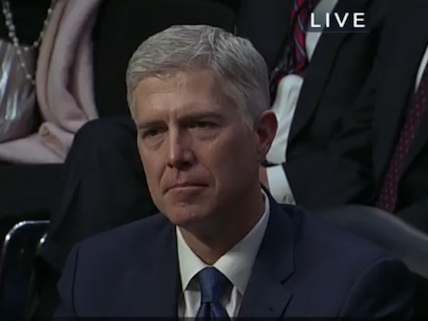

| Online: | |
| Visits: | |
| Stories: |

| Story Views | |
| Now: | |
| Last Hour: | |
| Last 24 Hours: | |
| Total: | |
Neil Gorsuch to Senate Judiciary Committee: ‘Yes, the Constitution Definitely Contains Privacy Rights’
 In his 2006 book The Future of Assisted Suicide and Euthanasia, Neil Gorsuch expressed significant doubts about the propriety of the U.S. Supreme Court recognizing and defending unenumerated constitutional rights under the Due Process Clause of the 14th Amendment. Citing the work of the late conservative legal scholar Robert Bork, Gorsuch wrote that the Due Process Clause has been stretched “beyond recognition” by the Supreme Court when the Court interpreted it to be “the repository of other substantive rights not expressly enumerated in the text of the Constitution or its amendments.”
In his 2006 book The Future of Assisted Suicide and Euthanasia, Neil Gorsuch expressed significant doubts about the propriety of the U.S. Supreme Court recognizing and defending unenumerated constitutional rights under the Due Process Clause of the 14th Amendment. Citing the work of the late conservative legal scholar Robert Bork, Gorsuch wrote that the Due Process Clause has been stretched “beyond recognition” by the Supreme Court when the Court interpreted it to be “the repository of other substantive rights not expressly enumerated in the text of the Constitution or its amendments.”
Today Gorsuch was asked about that part of his book during his SCOTUS confirmation hearings before the Senate Judiciary Committee.
“I’m interested in your view of privacy,” said Sen. Chris Coons (D-Del.). As every con-law aficionado watching immediately understood, Coons was referring to the fact that the right to privacy appears nowhere in the text of the Constitution. Indeed, it is precisely the sort of thing that Gorsuch meant when he referred to (and criticized) “substantive rights not expressly enumerated in the text of the Constitution or its amendments.”
Coons wanted to know what Gorsuch had to say about the matter now. “Do you believe the Constitution contains a right to privacy?” he asked the nominee.
“Yes, Senator, I do,” Gorsuch responded. “Privacy is in a variety of places in the Constitution,” he said, such in the Fourth Amendment right to be free from unreasonable searches and seizures, as well as in the Third Amendment’s prohibition on the quartering of troops in private homes during peacetime. And the Supreme Court has said for decades that the “Due Process Clause protects privacy in a variety of ways,” Gorsuch added. “So Senator, yes, the Constitution definitely contains privacy rights.”
That is a very noteworthy answer. The idea that “the Constitution definitely contains privacy rights” is the exact opposite of what Robert Bork thought about this issue. Indeed, Bork was famous for castigating the Supreme Court for its 1965 decision in Griswold v. Connecticut, in which the Court first recognized a constitutional right to privacy in the course of striking down a state law prohibiting married couples from obtaining birth control devices. The problem with Griswold, Bork wrote in the Indiana Law Journal, was that the Court invented “a new constitutional right” out of thin air. “When the Constitution has not spoken,” Bork declared, “the only course for a principled Court is to let the majority have its way.” In other words, because the Constitution does not expressly list the right to privacy, the Supreme Court has no business enforcing that unwritten right against legislative enactments. Under the Bork-ian view, only enumerated rights are entitled to judicial protection.
Neil Gorsuch certainly seemed to take the Bork-ian view in his 2006 book. But today at his SCOTUS confirmation hearings, Gorsuch seemed to take a different view. In fact, Gorsuch’s argument today that “privacy is in a variety of places in the Constitution” sounds a whole lot like the Griswold case’s well-known argument that a “zone of privacy” can be found among the “penumbras” and “emanations” of the Constitution’s explicit guarantees.
Does Gorsuch now reject the Bork-ian view of unenumerated rights? Or was he simply summarizing existing legal doctrine and keeping his own views to himself?
I encourage other members of the Senate Judiciary Committee to press Gorsuch with follow-up questions about this fundamental matter of constitutional law and interpretation.
Source: http://reason.com/blog/2017/03/21/neil-gorsuch-to-senate-judiciary-committ


